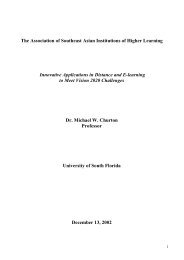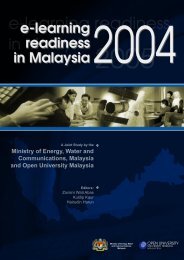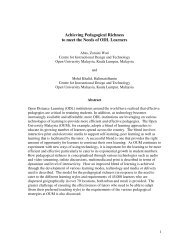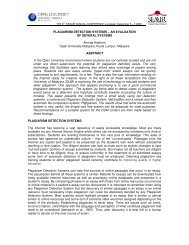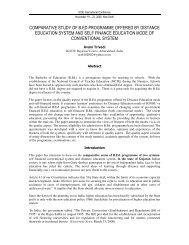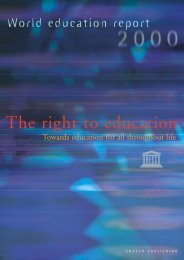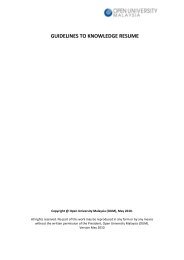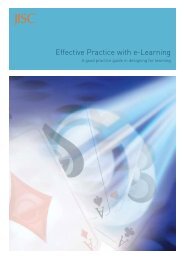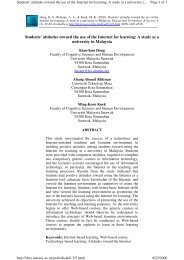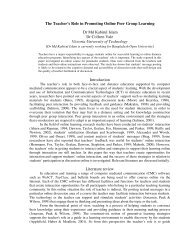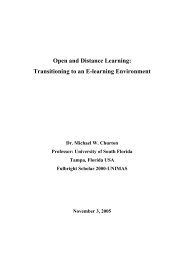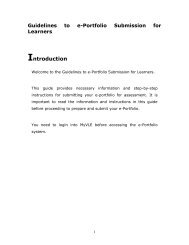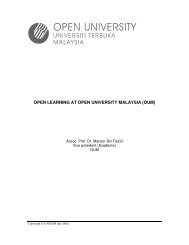lifelong learning and distance higher education - Asia Pacific Region
lifelong learning and distance higher education - Asia Pacific Region
lifelong learning and distance higher education - Asia Pacific Region
- No tags were found...
Create successful ePaper yourself
Turn your PDF publications into a flip-book with our unique Google optimized e-Paper software.
up their own accreditation or certification agency. However, any quality assurance oraccreditation system that is not backed by national or other competent authorities is verydifficult for outsiders to judge.A similar problem appears with joint degrees, which are offered by <strong>higher</strong> <strong>education</strong>institutions in various countries. Such programmes are often not covered by a nationalquality assurance or accreditation system. Even though one would expect such crossborderforms of <strong>education</strong> to be internationally recognised, they are a complicatedmatter for credential evaluators as their status <strong>and</strong> quality are often hard to identify. TheBologna process reinforces the rise of international co-operative forms of <strong>education</strong><strong>and</strong>, especially given the emphasis on international employability, an urgent solution isrequired to enhance recognition in these fields, too.INTERNATIONAL INITIATIVES TO PROMOTE QUALITYASSURANCETo achieve transparency in quality assurance <strong>and</strong> accreditation at the international level,close collaboration between national <strong>and</strong> international parties is required. Due to theimpact of quality assurance on international recognition, this process is also of greatimportance for the NARIC/ENIC networks, which are major players in the processof international recognition. This section gives an overview of the most importantinternational developments regarding quality assurance in <strong>higher</strong> <strong>education</strong> (see alsoDivis, forthcoming).An important actor promoting quality assurance at the European level is the EuropeanAssociation for Quality Assurance in Higher Education (ENQA). ENQA <strong>and</strong> theNARIC/ENIC networks have set a joint agenda to develop an information system onnational quality assurance <strong>and</strong> accreditation mechanisms for foreign target groups <strong>and</strong> acommon language on how to deal with cross-border <strong>education</strong>. In addition, the EuropeanUniversity Association (EUA) <strong>and</strong> the National Unions of Students in Europe (ESIB)fulfil key roles in enhancing quality in <strong>higher</strong> <strong>education</strong> institutions, making nationalsystems as transparent as possible <strong>and</strong> achieving international recognition of othercountries’ quality judgments <strong>and</strong> accreditation statements.A number of accreditation organisations, including members of the ENQA, originallyfrom eight countries that introduced national accreditation systems, have establishedthe European Consortium for Accreditation (ECA). The ultimate objective of ECA, inshort, is to accept each other’s national accreditation statements. This might be crucial forinternational recognition, because these countries could use ECA to automatically recogniseeach other’s national degrees instead of on a case-by-case basis. The NARICs/ENICs fromFl<strong>and</strong>ers <strong>and</strong> the Netherl<strong>and</strong>s are the first two to do this (see the section below).The Joint Quality Initiative is an informal network of representatives primarily fromquality assurance organisations <strong>and</strong> ministries in Europe. The network aims to increaseinternational collaboration on quality assurance <strong>and</strong> to enhance the transparency ofEuropean Bachelors <strong>and</strong> Masters programmes. From the perspective of recognition,the JQI’s most important output is the document Shared descriptors for Bachelors <strong>and</strong>Masters degrees (the “Dublin descriptors”), in which generic <strong>learning</strong> objectives orcompetencies are formulated.UNESCO’s European Centre for Higher Education (CEPES) also provides importantbackstopping in the field of accreditation. As part of a project on Strategic Indicatorsfor Higher Education in the Twenty-First Century, CEPES has analysed the quality124



